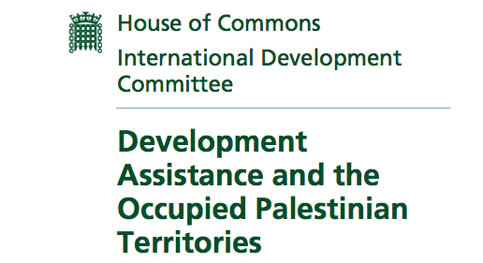House of Commons 31 January 2007

The situation in the Occupied Palestinian Territories is worse now than it was in 2004, politically, economically and socially, despite their receiving more humanitarian assistance per capita than any other country in the world, says today’s report from the International Development Committee on Development Assistance and the Occupied Palestinian Territories.
Rt Hon Malcolm Bruce MP, Chairman of the Committee said: “The international community is in danger of preventing the creation of a viable Palestinian state.”
The Committee urges the Quartet to work more proactively towards the goal of a two-state solution, as set out in the Roadmap, through talks between the parties and through measurable and internationally monitored steps to achieve it. The Committee held an inquiry three years after the previous Committee’s report to assess change in the development situation since 2004.
In particular, the Committee examined the impact on the development situation of the Hamas election victory in January 2006, and the international community’s response to the formation of the Hamas-led Palestinian Authority. The Hamas leadership’s refusal to accept the principles of the Quartet led international donors to withdraw direct budget support to the Palestinian Authority. This had provided $30 million a month.
The Government of Israel has also withheld tax revenues which it collects on behalf of the Palestinian Authority, which amount to about $60 million a month. The combined effect has been the withholding of 75% of the Palestinian Authority’s budget.
The Committee reports that, as a result, the Palestinian Authority is facing financial crisis and that this is seriously affecting the Palestinian people: 51% of Palestinians are now food insecure and 66% of families are below the poverty line. The report questions whether the withholding of funds from a democratically-elected government in the conflict-affected Territories is the most effective response to Hamas’s refusal to accept the Quartet principles. The boycott of the Hamas-led Palestinian Authority has led it increasingly to look elsewhere for funding which means it is being drawn closer to governments such as that of Iran.
The Committee doubts whether this is a development the international community would have intended. The Committee accepts that the Government of Israel has genuine security concerns and a duty to protect its citizens but questions the proportionality of its actions, the human cost and their likely effect on long-term peace in the region.
The report highlights that the actions of the Government of Israel, including an expansion of Israeli settlements on occupied territory, security measures such as the construction of a separation barrier and separate roads, and restrictions on Palestinian access and movement, continue to harm the economic prospects of a future Palestinian state.
Malcolm Bruce MP, Chairman of the Committee said: “We believe there is a fundamental relationship between Palestinian economic viability and Israeli security. The benefits from the achievement of both would be mutual.” In November 2005, the Agreement on Movement and Access was made between Israel and the Palestinians. The Agreement seeks to open crossings between Gaza and Israel and Gaza and Egypt, and to ease restrictions on movement within the West Bank as well as between the West Bank and Gaza. But Israel has failed to implement many of the agreed measures.
Most of the access points for people and goods in and out of Gaza have been closed or are operating at limited capacity. The Chairman of the Committee said: “If the Agreement on Movement and Access was properly implemented, it would provide a significant boost to the Palestinian economy. Making the Agreement work should be a priority for Israel, the Palestinians and for the international community.”
The Committee visited the region in November 2006 and saw the detrimental effects the financial crisis is having on ordinary people. Salaries of public servants have not been paid since March. Many, including school-teachers and health workers, have been on strike and public services, particularly health services, are in a state of near collapse.
As a means of mitigating the worst effects of the financial crisis, the EU has created a Temporary International Mechanism. This has helped fund supplies of fuel in Gaza after the bombing of the power plant by Israel, and has made payments to 100,000 of the poorest and to key workers, including health workers.
Malcolm Bruce MP, Committee Chairman said: “The Temporary International Mechanism is a timely response to the crisis but it cannot meet the needs of the majority of the Palestinian people. If the TIM proves to be anything more than a temporary arrangement, beyond the current year, there is a real risk that the Palestinian Authority may be fatally undermined.”
To download the full report (PDF) click here.
The membership of the Committee is as follows: Malcolm Bruce MP (Chairman, Lib Dem), John Barrett MP (Lib Dem), John Battle MP (Lab), John Bercow MP (Con), Hugh Bayley MP (Lab), Richard Burden MP (Lab), Mr Quentin Davies MP (Con), James Duddridge MP (Con), Ann McKechin MP (Lab), Joan Ruddock MP (Lab), Mr Marsha Singh, MP (Lab).
More Information
Related Links